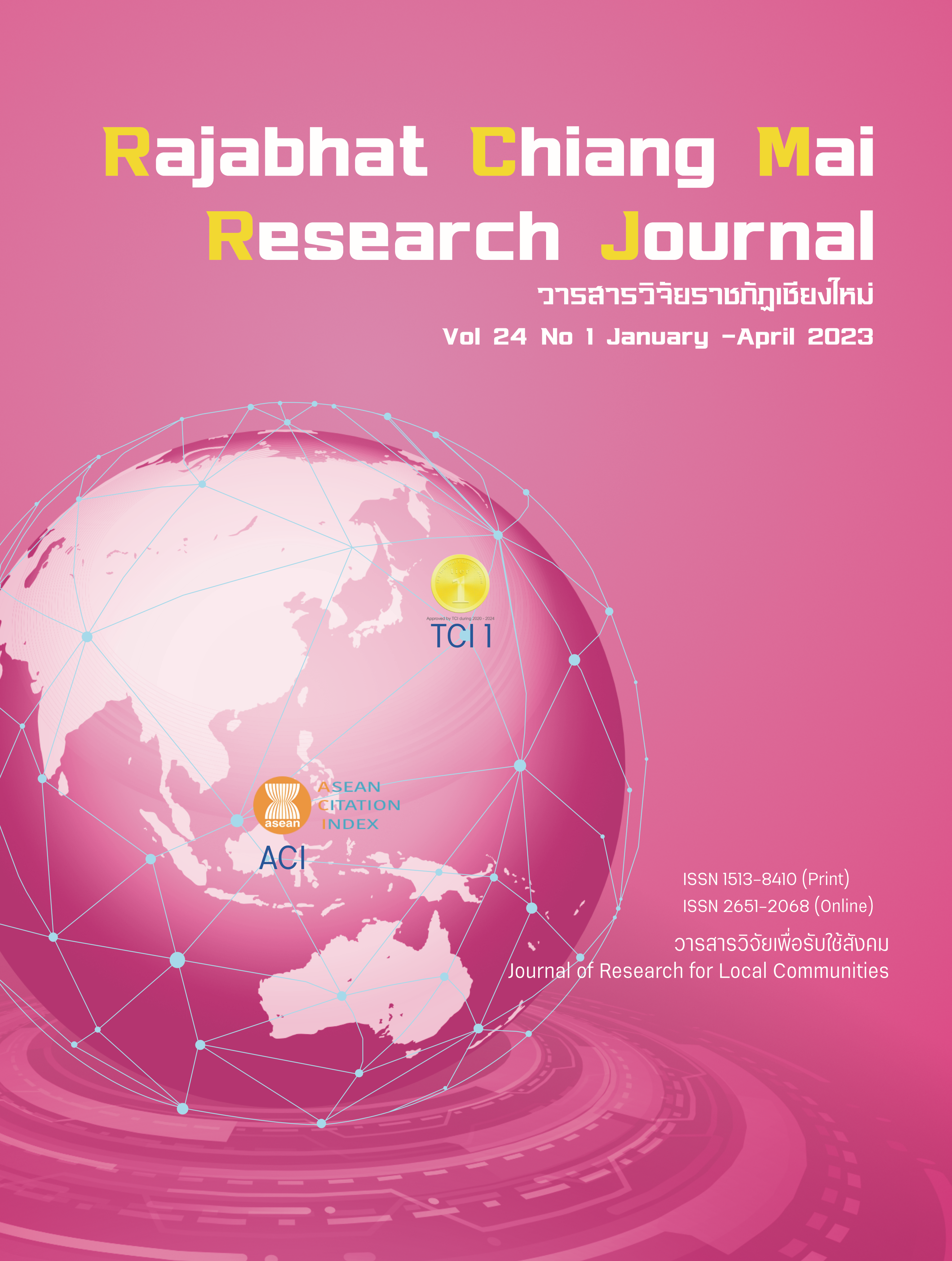The Integration of Community-Based Technology Transfer using the KWL Plus Technique for the Acceleration of Sustainable Community Enterprises in Phetchabun Province
DOI:
https://doi.org/10.57260/rcmrj.2023.263168Keywords:
Integration, KWL Plus technique, Community enterprise, Krayasart, PhetchabunAbstract
This study aims to create and develop technology transfer and local wisdom through community involvement in the production of the rice-based Thai dessert known as Krayasart while also monitoring and evaluating the technology transfer and local wisdom processes. The sample group for this study consists of Ban Na Ruamjai Women's Community Enterprise and a total of 40 participants who are enthusiastic about taking part in the manual transfer project on fusing technology and local expertise to advance community enterprises about producing Krayasart using the KWL Plus technique. The following research resources were employed: (1) data recording of conversations with community business groups regarding the Krayasart, (2) the KWL Plus technology transfer methodology, and (3) a satisfaction survey for the KWL Plus technique manual's use of local knowledge, using which project participants are questioned. The findings indicate that the handbook on technology transfer using the KWL Plus technique is a manual that is appropriate for both technology transfer and local wisdom, and it includes information on nine distinct knowledge areas. The IOC result is 0.93, which is a helpful number that fits within the assessment range of 0.5 to 1.00 for the IOC efficiency. In order to improve community enterprises that educate people how to construct the Krayasart using the KWL Plus app application, the researcher has created a handbook for fusing technology with local expertise. Results of the transfer showed that, with a mean of 4.73 and a standard deviation of 0.45, the project's participants were satisfied with their participation in the manual transfer of technology integration and local knowledge for the advancement of community enterprises in the highest-quality Krayasart production using the KWL Plus technique.
Downloads
References
Carr, E., & Ogle, D. (1987). “K-W-L Plus: A Strategy for Comprehension and Summarization.” Journal of Reading, 30(7), 626-631. https://www.jstor.org/stable/40031872
Chokrattanachai, W., Romnukool, P., Chaiyawong, H., & Apairat, M.. (2017). Transfer of bakery technology for health. by participating of the schools under the Nakhon Ratchasima Provincial Administrative Organization. Area Development Research Journal, 9(4), 257-273. https://so01.tci-thaijo.org/index.php/abcjournal/article/view/106374 (In Thai)
Department of Agricultural Extension. (2018). Summary report of community enterprise activities/community enterprise networks classified by area. Community enterprise handbook department: Phetchabun. (In Thai)
Department of Cultural Promotion. (2016). Culture, way of life and wisdom about Krayasart
in the tradition of making merit from the ancestors. Ministry of Culture, Bangkok. (In Thai)
Duangkaew, N. (1991). Geography learning management. by using the KWL Plus technique to develop students' analytical thinking skills Wat Chang Khian School Chiang Mai Province. (Thesis. Master of Education Program Department of Teaching Social Studies, Chiang Mai University.) (In Thai)
Kaewsara, W. (2012). Effects of KWL Plus on Learning Achievement and Self-Efficacy in Thai Subject of Bilingual Grade Six Students. (Thesis (M.A. (Psychology))--Prince of Songkhla University.) (In Thai)
Khambunlue, C. (2019). Increasing Efficiency of Cutting Process Thai Enterprises Kanom (Krayasart) of Small Enterprises Kanom Thai Ban Tak. (Department of Industrial Engineering, Faculty of Engineering,Rajamangala University of Technology Lanna Tak.) (In Thai)
Macacheep, S. (2013). A Research and Development on Industrial Potential of Krayasart Products. Rajamangala University of Technology Suvarnabhumi. (In Thai)
Nuengkratok, S. (2007). Making Krayasart. Chokchai District Learning Center: Nakhon Ratchasima. (In Thai)
Ogle, Donna. (1986). K-W-L: A Teaching Model That Develops Active Reading of Expository Text. Reading Teacher, 39(6), 564–570. https://www.jstor.org/stable/20199156
Orthom, T. (2012). Thai desserts. Bangkok: Rungthiwa printing. (In Thai)
Phudang, T., & Wanida, P. (2020). Transfer of production technology and production management of “Kanom Kong” to the community. Journal of Education, 14(1), 9-16. https://edujournal.bsru.ac.th/publishes/16/articles/267 (In Thai)
Rojpaisarnkit, K. (2013). Participatory action research for improving hygiene standard and packaging of “Kanom Kayasart” of Banwangkhwai small organic agriculture. Department of Health Education, Faculty of Public Health, Burapha University. (In Thai)
Sornin, P. (2017). A study of the reading and writing abilities of Thai language students. Primary Education 1 by KWL-Plus Learning Management. (Master's Degree Thesis in Educational Administration, Faculty of Education. Far Eastern University.) (In Thai)
Suttarin, S. (2004). The Effects of KWL-Plus Instruction on Reading Comprehension and English Writing Comprehension of Mathayomsuksa 3 Students at Mengrai Maharat Wittayakhom School. (Master of Education Thesis Department of Curriculum and Teaching Secondary School. graduate school Chiang Rai Rajabhat University.) (In Thai)
Thatthong, N. (1985). Applied Statistics in Education 1 (revised edition). Khon Kaen: Faculty. Education, Khon Kaen University. (In Thai)
Wongprateep, N. (2014). Added Value and Development of Seasoned Krayasart by Housewives in Phichit Province. Research Report. Pibulsongkram Rajabhat University. Phitsanulok. (In Thai)
Downloads
Published
How to Cite
Issue
Section
License
Copyright (c) 2023 Rajabhat Chiang Mai Research Journal

This work is licensed under a Creative Commons Attribution-NonCommercial-NoDerivatives 4.0 International License.
1. Articles, information, content, images, etc published in the “Community and Social Development Journal” are copyrighted by the Community and Social Development Journal, Chiang Mai Rajabhat University. In order to properly distribute the articles through print and electronic media, the authors still hold the copyright for the published articles under the Creative Commons Attribution (CC BY) license, which allows the re-distribution of the articles in other sources. References must be made to the articles in the journal. The authors are responsible for requesting permission to reproduce copyrighted content from other sources.
2. The content of the articles appearing in the journal is the direct responsibility of the article authors. The editorial board of the journal does not necessarily agree with or share any responsibility.














